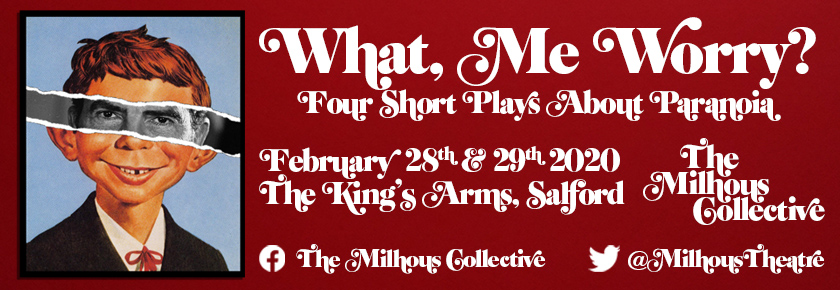Described as “four short plays about paranoia”, The Millhous Collective’s ‘What, Me Worry?’ at the King’s Arms Salford was on the surface a great piece of fringe theatre. You cannot ignore the delightfully talented cast and a collection of writers who know how to write with their performers in mind. However, the show itself was a mish-mash of ideas and artistic license. For me, the stories had no real ties to each other, and didn’t quite fit the show’s thematic motif of worry and paranoia.
That said, each of the stories individually certainly had their own merits and standout points, even if the performance in my opinion lacked a creative hook to bring these narrative strands together.
Story one, “A Censorship Play”, was an interesting interpretation of the wanton censorship of British cinema. This was playfully told through the story of a disenfranchised director in a war with words with a morally righteous film censor seeking to strip back a film that - by the sounds of it - was something akin to The Passion of The Christ meets The Excorsist, with a little 50 Shades of Grey in there for good measure. Despite veteran theatre performer Stewart Mathers as the visionary director stumbling his lines in part (and some overacting from his colleagues Lauryn Elise, Mia Pencavel and in some places Andrew Marsden) this was a funny, lighthearted way to welcome the audience into the show. That said, at this point I couldn’t quite see the link between this sub-story and the premise of the show, which supposedly was worry and anxiety.
Story two, “No Place Like Home”, was a bit more hard-hitting. Here we met a nervous recluse played fabulously by Sarah Maher. Coerced into opening the door to a runaway convict wanted by the police, you could see her growing as a character before our very eyes. Worth a mention is Keith Pennington and Helen Lewis, who played a dynamic duo of police officers as different as chalk and cheese, but who gave the audience some much needed - if ostensible - comic relief.
After a short interval - somewhat punctuated by the Act 2 cast warming up onstage - we were instantly thrown back into the tumultuous world created by the The Milhous Collective theatre group with the penultimate story of the night, “It’s Good to Talk”.
This third story saw the inside of a group therapy session as they anxiously awaited their missing therapy leader. While most of the characters were almost archetypal of the kind of person you’d expect to attend therapy - a cantankerous old man, a habitual obsessive compulsive cleaner and a shy, socially anxious over-thinker, anyone? - the one character played superbly by Chantelle Pierre, was a breath of fresh air amongst the almost suffocating stereotypes. All in all a good story, which saw Joshua Young take the lead as a socially awkward man who overcomes his fears by making small talk with the hostile group - although in my opinion this story is perhaps the weakest narratively of them all.
The fourth and final story, “The Twenty-Third Floor”, where the magic truly happened. At first glance, this looked to be a story about two university students in London - again, as different as chalk and cheese - but the story quickly became much more than the tale of burnt Super Noodles and stories of the morning-after-the-night-before.
Emotionally and theatrically the best of the bunch, this tale was as tragic as it was unexpected, depicting the story of the Grenfell Tower disaster, as told from the point of view of a neighbouring high-rise. In parts permeated with bouts of British humour pre-tragedy, this story had it all - superb acting by Rory Cohen and Duncan McCombe, who as the story’s protagonists played off each other perfectly, as well as a storyline that left a tear in my eye.
By far the most powerful and emotive section of the whole play was when the duo were facing the audience, reciting a righteously angry duologue to the sombre and reflective audience about politicians in their mansions, passing blame on a needless disaster that cost hundreds of innocent lives - whilst in the background stood the rest of the cast, silently holding up placards in silent protest for all that was lost that fateful night.
A powerful moment in a powerful story in what was for the most part a powerful performance, masterfully delivered by a theatre company with countless rising stars in its midst.
A delightful - if sometimes slightly misguided - show, which has its heart firmly in the right place.
Reviewer: Hannah Wilde
Reviewed: 28th February 2020
North West End UK Rating: ★★★

